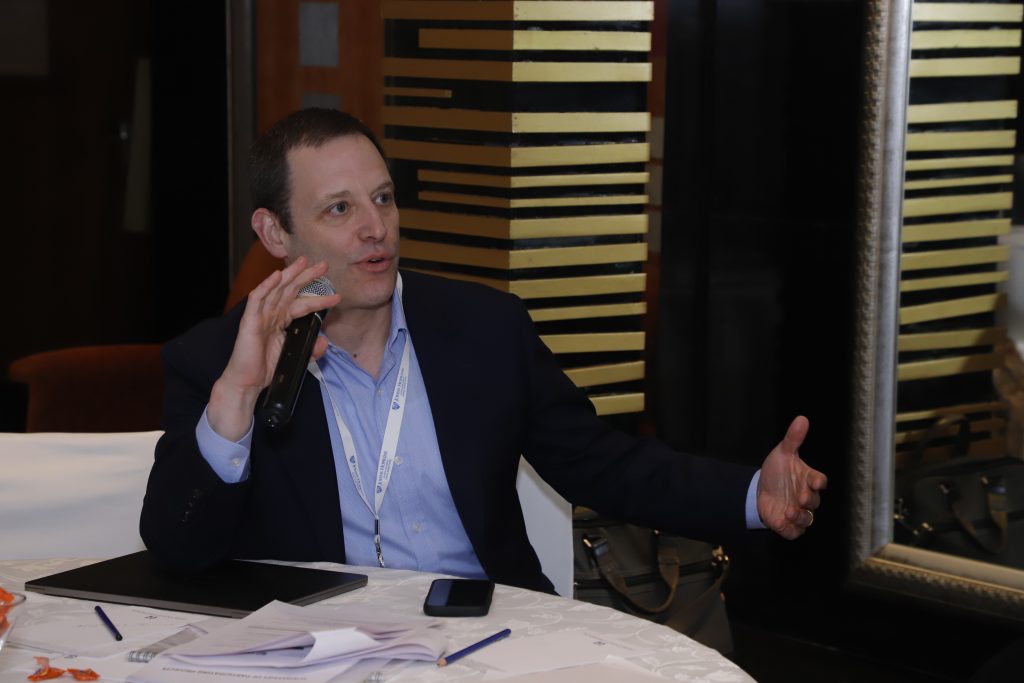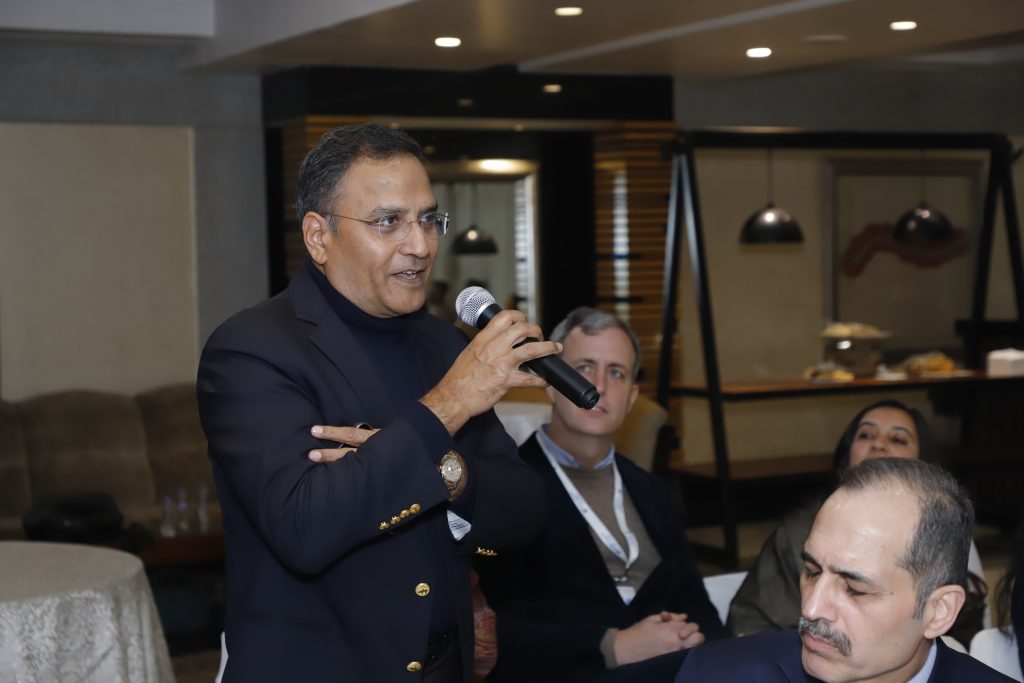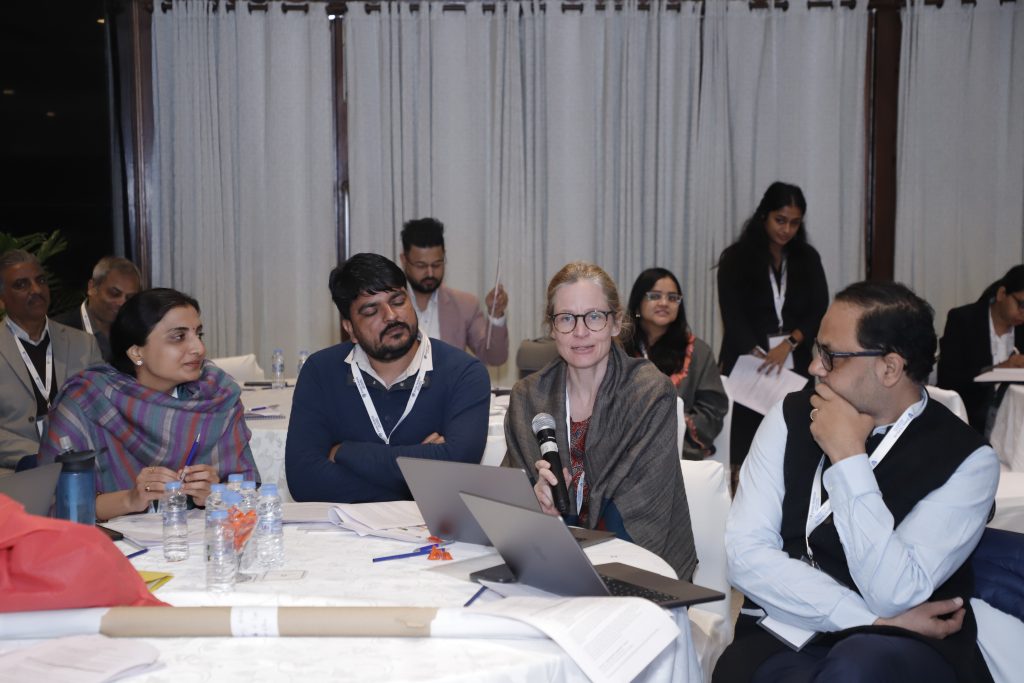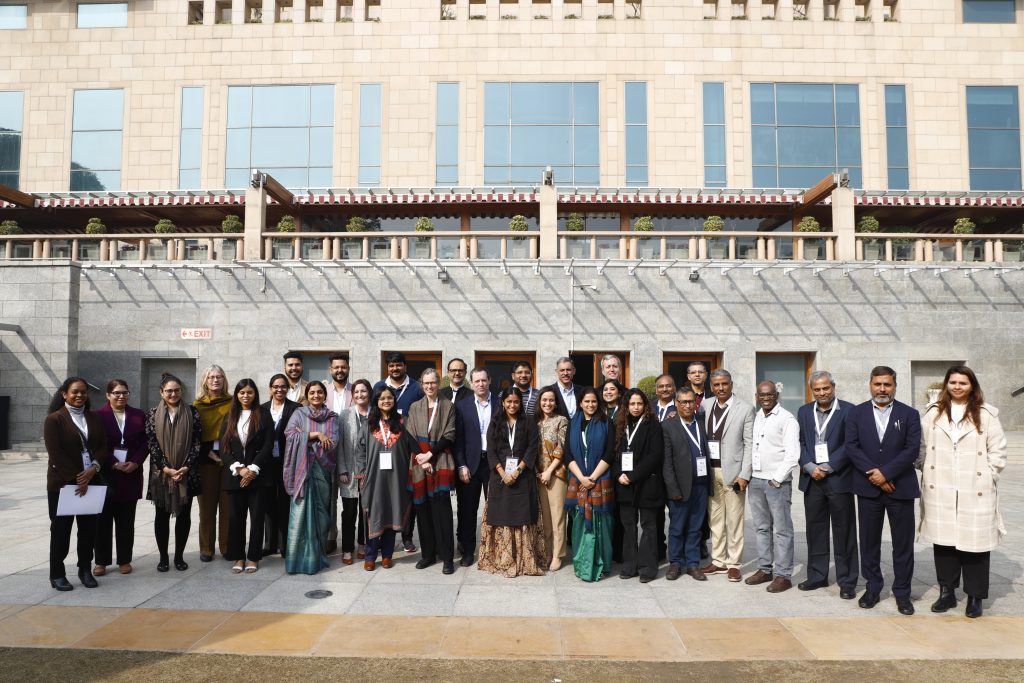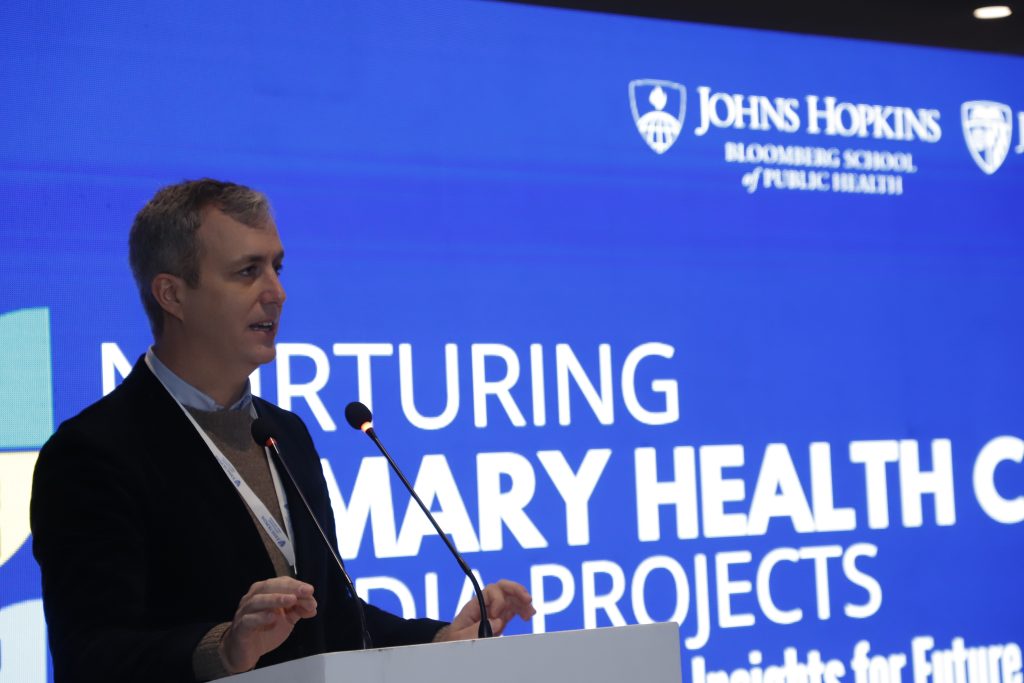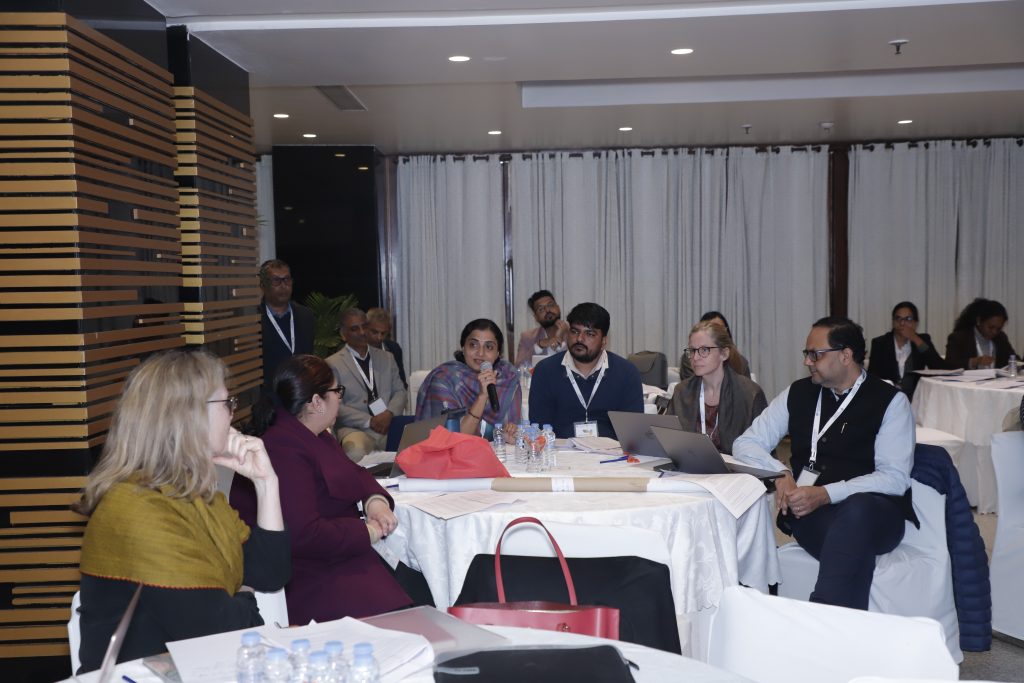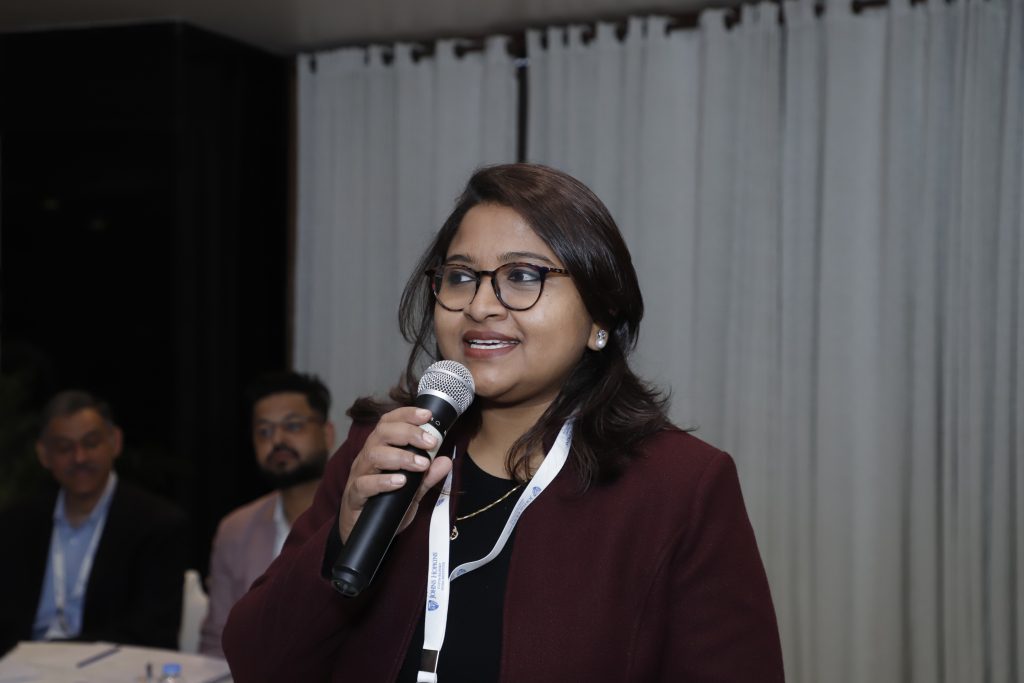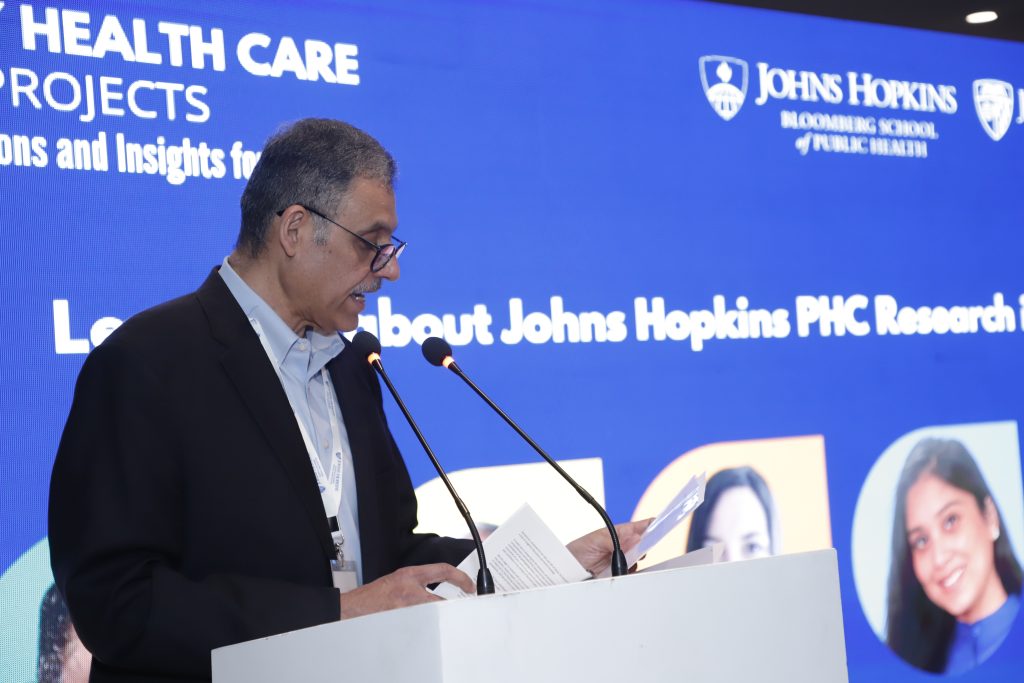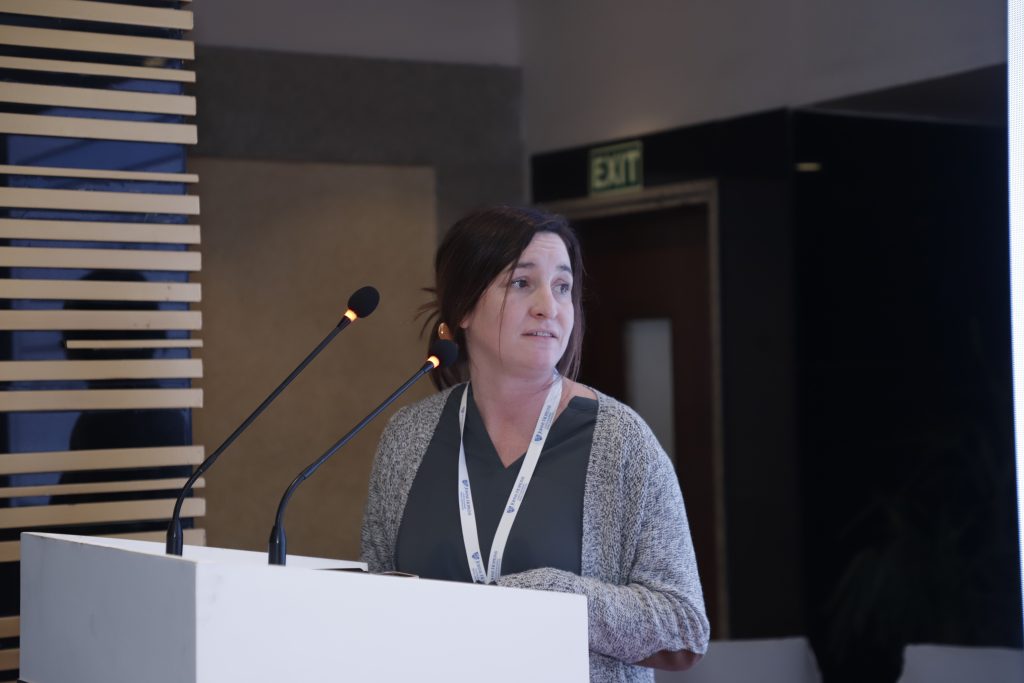PHC Symposium 2024
The PHC Symposium is an annual gathering that brings together faculty and researchers from the Johns Hopkins Bloomberg School of Public Health and project teams based in India. Its purpose is to tackle challenges, foster collaboration, and identify future research areas and partnerships for Primary Health Care (PHC) initiatives in India, thereby shaping the future of healthcare in the country. Organized by the Johns Hopkins Gupta-Klinsky India Institute and the Health Systems Program – Department of International Health at the Johns Hopkins Bloomberg School of Public Health, this symposium serves as a pivotal platform for faculty and researchers dedicated to PHC research projects in India.
This year, the event took place on January 18-19, 2024, providing a unique opportunity for participants to connect, share experiences, and collectively envision the future of Johns Hopkins’ PHC work in the country. The symposium featured interactive sessions centered around key themes: Know, Learn, Reflect, and Vision. Participants delved into ongoing PHC projects, shared perspectives, and engaged in discussions on evolving evidence, strategies, and practices. The discussions addressed emerging issues and challenges while exploring deeper insights into potential research areas and collaborations for future PHC initiatives in India.
Panel Discussions
Speakers:
- Dr Atul Kotwal, Executive Director, National Health Systems Resource Centre, New Delhi
- Dr Rajani Ved, Director Health, Bill & Melinda Gates Foundation, New Delhi
- Dr Aarushi Bhatnagar, Senior Economist Health, World Bank, India
The speakers provided insights into the established institutional structures within the decentralized National Health Mission (NHM), emphasizing the presence of community platforms at various levels. Capacity-building initiatives, including the Mission Karmayogi platform, were highlighted, focusing on officials from higher levels to the grassroots, specifically at Health and Wellness Centers (HWCs).
Institutional Structures and Capacity: Dr. Kotwal underscored efforts at the state level to enhance institutional capacity, such as increasing the number of State Health Systems Resource Centers (SHSRCs) and augmenting their budgets. States like Chhattisgarh and Tamil Nadu stood out for their robust governance mechanisms, credited for better public health outcomes with relatively low per capita spending. Challenges in transitioning from selective to comprehensive care were acknowledged, with a call for evaluating the design, mandate, position, and role evolution of these institutions.
Community Level Institutions: Dr. Ved delved into community-level institutions, discussing the initial intention of embedding ASHA in community structures. Challenges in training committee members were recognized, but states like Odisha, Chhattisgarh, and Kerala showcased potential when facilitated by civil society organizations or strong local governments. While acknowledging the potential, the need for adequate funding and support was emphasized.
Financing for PHC: The session highlighted the increasing focus on PHC over the last decade, especially post-COVID, with challenges persisting in terms of high out-of-pocket expenses. Rather than a simplistic increase in the budget, the focus was on spending more efficiently. The TN example illustrated slightly higher budget spending coupled with improved mechanisms for expenditure. Suggestions included a results-based approach, increasing taxation, and exploring blended financing models with capitation.
Public-Private Partnership (PPP) Models: The discussion touched upon the challenges faced by PPP models in the primary healthcare space. The limitations of for-profit private providers in delivering preventive and promotive care were acknowledged, leading to a transition in some states towards in-house models, especially for diagnostics.
In essence, the session unfolded as a comprehensive exploration of the intricacies and potential solutions in financing and governance within the PHC health systems, emphasizing the need for strategic evaluations and innovative approaches to address the evolving landscape.
Speakers:
- Dr. Somesh Kumar, Country Director, JHPIEGO India
- Dr. Devaki Nambiar, Program Director, Healthy Societies Strategy, The George Institute of Global Health
- Meike Schleiff, Scientist, Alliance for Health Policy, and Systems Research, World Health Organization
The panel delved into the crucial theme of developing inclusive Primary Health Care (PHC) systems for vulnerable populations, featuring insightful perspectives from Dr. Somesh Kumar, Dr. Devaki Nambiar, and Meike Schleiff.
Global Overview of Community Engagement: Meike Schleiff provided a global perspective on community engagement, emphasizing its pivotal role in achieving Universal Health Coverage, particularly for women. Acknowledging exemplary work in India, she stressed the need to invest in communities. Challenges like multi-sectoral collaboration and engagement with other sectors were highlighted, with a call to prioritize community engagement at the WHO level.
Regional Insights on Community Engagement: Dr. Devaki Nambiar shared regional insights, noting that community engagement often functions as an “invited space,” which may pose accessibility challenges for communities. She discussed the labor aspect of community-based initiatives, such as village health committees, highlighting the importance of wage replacement.
Health as an Outcome of Social Determinants: Dr. Somesh Kumar advocated for viewing health as an outcome of social determinants, emphasizing equity and inclusion through convergence with non-health departments. He highlighted the potential of Jan Arogya Samities, with the active participation of women, youth, and migrant populations.
Utilizing Traditional Healers and Quasi-Doctors: The discussion touched upon the continued reliance on quasi-doctors and traditional healers in certain Indian states, particularly in the north-east. The panel explored the possibility of engaging these individuals as bridges between formal health systems and communities.
Funding Opportunities and Role of Organizations: The panel explored funding opportunities for community engagement, particularly government-led initiatives. The role of organizations like WHO and JHPIEGO was discussed, with a consensus that strong evidence is needed to build a compelling case for funding. Acknowledging the complexity of funding for community engagement, the panelists proposed that governments should empower communities to have control over allocated funds.
Future Directions for Community Engagement: In the final section, the panel emphasized the need for additional resources and capacity building for effective community engagement. It was underscored that community engagement should be a standalone initiative rather than just a component of larger programs. Operationalizing Jan Arogya Samitis effectively and institutionalizing community feedback mechanisms emerged as robust mechanisms for community engagement.
The panel concluded that community engagement, when properly resourced and integrated, holds the key to building inclusive PHC systems that cater to the needs of vulnerable populations.
Session Summaries
Speakers:
- Shalini Singh, Senior Researcher, Johns Hopkins India (JHPIEGO Community Engagement Project)
- Aditya Singh, Executive Director and Deputy Chief of Party, ACCELERATE
- Raghukul Ratan Pandey, Senior Research Officer, UP Project
In her presentation on “Enhancing Community Engagement through HWCs: Early Insights from Exploratory Research in Chhattisgarh & Jharkhand, India,” Shalini Singh shared insights on developing a community engagement strategy for Health and Wellness Centers (HWCs) in Chhattisgarh and Jharkhand states of India. This ongoing initiative, funded by Jhpiego India under USAID’s health systems project NISHTHA, is currently in an exploratory phase. It covers a range of objectives, including understanding community perspectives, engaging with HWC providers and administrators, exploring current engagement methods, employing design thinking for innovative ideas, and creating a toolkit for effective community engagement in primary healthcare.
The preliminary findings emphasize the multifaceted nature of community engagement, underlining the importance of contextual understanding, alignment with community needs, and a nuanced approach to addressing socio-cultural and political dynamics. This foundational work has shifted the focus from “population healthcare” to a broader perspective of “population health.”
The historical context is identified as a key influencer, highlighting Chhattisgarh’s stronger community engagement due to an emphasis on a historical rights framework, fostering collaboration through the Mitanin network. Interviews reveal a notable disconnection between community needs and health system agendas, emphasizing the need for aligning interventions with broader public services or social determinants of health. Intangible factors like gender, power dynamics, and trust impact community engagement structures, requiring careful consideration.
Three core components—agents, structures, and processes—are identified as crucial elements for effective community engagement. Key agents include primary healthcare teams, local government representatives, tribal leaders, traditional healers, active community members, youth facilitators, and students. While clear steps are identified in Chhattisgarh, Jharkhand faces issues of fragmentation and limited coordination in engaging communities in health. Government focus on reporting and data generation lacks subsequent analysis for impactful outcomes. Essential inputs like facilitation, training, and finance are identified as foundational, with supportive supervision and technical assistance emerging as critical elements for optimal outcomes.
Aditya Singh’s presentation on Project ACCELERATE highlighted the project’s commitment to community-led HIV programming. The focus was on the significance of non-HIV entry points to enhance access to HIV treatment. Within this framework, the project established Mitr (meaning ‘friend’ in Hindi) clinics specifically designed for the transgender community and Adolescent Friendly Health Centers (AFHC) targeting adolescents living with HIV with the objective to enhance care for these key populations.
The Mitr clinics are vital in helping community members navigate different departments and access necessary services through network building. To ensure clinic sustainability, the project collaborates with the Ministry of Social Justice and Empowerment and corporate social responsibility teams. Key insights from the presentation focused on the dynamic nature of risks faced by key populations, emphasizing the need for ongoing dialogue. Dr. Aditya emphasized the importance of a person-centric approach that addresses health service needs and considers social determinants for effective community engagement.
In the third presentation, Raghukul Ratan Pandey from the Uttar Pradesh Health Systems Strengthening Project (HSSP) discussed the development of Health and Demographic Surveillance System (HDSS) in Uttar Pradesh for policy and program relevant research. The project is a partnership between JHU, UP Health Department, and AIIMS Gorakhpur. The project has been working in collaboration with the state government to ensure to generate evidence that is contextualized and relevant for the people of the state. The team has begun the process of community engagement by using a range of participatory tools like transect walk, community mapping, social mapping, FGDs, etc. The data analysis is ongoing, and the team expects to gain insights into the community’s resources, social infrastructures, networks, assets, and relational dynamics.
Key Takeaways:
1. Ongoing Community Dialogues: Continuous interaction with the community is vital to comprehend unique needs, values, and challenges. These dialogues offer crucial insights for tailoring interventions to align with cultural and social nuances. 2. Program Design Approach: Adopting an equity lens and considering social determinants enhance program effectiveness. Understanding socio-economic, cultural, and environmental factors provides a comprehensive understanding of community needs. 3. Multi-Sectoral and Inter-Departmental Strategies: Beyond traditional health services, programs should embrace collaboration across sectors like education and housing. This approach ensures a holistic response to the diverse needs of the community. 4. Community Engagement Measurements or Indicators: District-level initiatives provide an opportunity to develop measurable indicators, including participation rates and community satisfaction. These metrics gauge the perceived impact of health interventions. 5. Intangible Determinants: Acknowledging and addressing intangible factors such as power dynamics and gender roles are crucial for effective community engagement and empowerment. 6. Case Studies on Intangible Determinants: Highlighting success stories from different states illustrates how interventions positively impact intangible determinants. These cases serve as valuable examples and inspiration for addressing complex community dynamics.
Speakers:
- Zabir Hasan, Assistant Scientist, Health Systems, BSPH
- Aman M Mishra, Team Lead, Public Health Management & Leadership-UP Project
Zabir Hasan initiated the presentation, focusing on exploring primary-secondary integrated models in Low- and Middle-Income Countries (LMICs) under the Ayushman Bharat initiative in India. The scoping review, titled “Evidence of Integrated Primary-Secondary Health Care in Low- and Middle-Income Countries,” provided early insights into various integrated care types, emphasizing vertical integration. The review aimed to serve as a tool for implementing primary-secondary integrated models for universal health coverage. Discussions highlighted the fragmented nature of the Indian health system, the benefits of integrated care models, and challenges such as resource constraints. Innovative solutions, including digital health and efforts under Ayushman Bharat, were acknowledged. Adaptability to innovations was noted, but gaps persist in areas like rehabilitation, cancer, and palliative care.
The second speaker, Aman Mishra presented a leadership and management training initiative in Uttar Pradesh for mid-senior level medical officers. The training focused on recognizing personal leadership styles, developing leadership skills, and applying them to workplace challenges. The methodology incorporated didactic sessions, skill-building exercises, and mentorship projects addressing public health challenges. The group discussion highlighted the need for specialized guidance, action-driven problem-solving, positive faculty approach, and perceived benefits of the training. Participants reported increased self-awareness and identified gaps in competencies for effective leadership roles in health systems.
Key Takeaways:
- Building capacity and promoting better interlinkages within integrated care models are crucial for improving interlinkages within the health system.
- Incremental and sustained skill development is essential for capacity building in India’s healthcare system, requiring proper incentives and infrastructure development.
- Team-based care shows promise but necessitates adaptation of clinical management guidelines to local contexts.
- Achieving goals requires involvement from various stakeholders, including healthcare providers, policymakers, and community leaders.
- Leadership and management training are paramount for capacity building, with a focus on unlearning, self-awareness, and coaching.
- Effective solutions demand systemic changes, acknowledging systemic interdependencies and health systems support for addressing complex public health challenges.
Speakers
- Subhash Ghosh, Project Lead (YRG CARE, ACCELERATE)
- Akriti Mehta, Senior Public Health Specialist, India Primary Healthcare Support Initiative
- Smisha Agarwal, Associate Professor, Director, Center for Global Digital Health Innovation, BSP
- Swati Srivastava, Senior Program Officer, UP Project
The session focused on unraveling the intricacies of Primary Health Care (PHC) in India, specifically delving into Health Information Systems (HIS), evidence, and its practical application. The diverse healthcare landscape across Indian states was analogized as each state being akin to its own country.
Subhash Gosh – Project ACCELERATE: Subhash Gosh emphasized the pivotal role of data in primary health care, advocating for its better utilization, particularly with a focus on person-centered care. The discussion explored nuanced perspectives on data among clinicians, patients, and public health teams. Experiences from Project ACCELERATE, including routine HIV testing and preventive person-centered care, were shared. The discussion also addressed task shifting, evidence-based decisions, and measures taken to protect sensitive data.
Akriti Mehta – IPSI Project: Akriti Mehta discussed the construction of a performance measurement framework for PHC across three states, emphasizing the need to build on existing data monitoring systems. Considerations for data quality and triangulation with other sources were highlighted. The discussion addressed questions about building capacity at the district level and equity concerns within existing databases.
Smisha Agarwal – Exemplars in Digital Health: Smisha Agarwal outlined the project’s objective to transform PHC systems in India through digital technologies. Challenges in digitization efforts, such as weak data protection policies, were discussed. The session explored pain points in the digitization pathway, including state-level policies and data protection issues.
Swati Srivastava – UP Health Systems Strengthening Project: Swati Srivastava presented findings from Uttar Pradesh on data use and decision-making practices in PHC. Challenges in presenting sensitive findings to government stakeholders were highlighted, along with recommendations for improving data use, emphasizing the importance of manpower. The discussion recognized the potential improvement in data use for decision-making with enhanced data quality.
Key Takeaways:
- The ambitious nature of digitization in India compared to other countries.
- Data holds different values for different users within the health system.
- Learning from data use and evidence is crucial, drawing insights from both local experiences and the international context.
- Data quality is a recurring theme across all projects, with discussions focusing on checks, concerns, and adaptations.
- Emphasis on building on existing infrastructures for monitoring.
- Recognition of the potential for AI in the data infrastructure.
